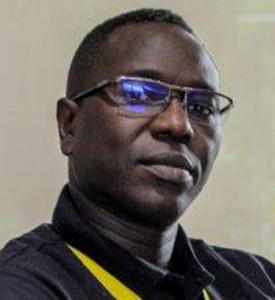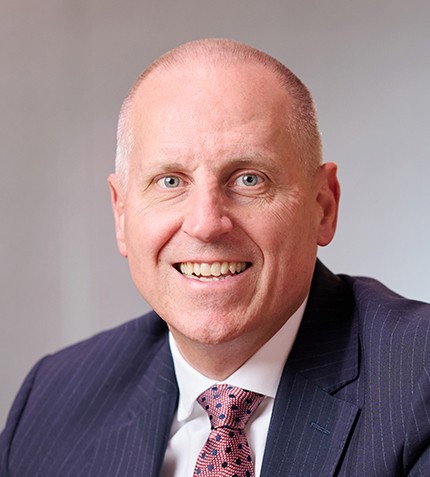
“DHL is very active in the gold mining sector and we are responsible for at least 7% of resource exports out of Ghana. Our export activities are important in terms of value; not necessarily in terms of volume. We are handling the exports of four major gold mines in the country.”
Serigne Ndanck Mbaye
CEO, DHL GHANA
Can you give a brief overview of DHL Ghana and the company’s operations in West Africa?
DHL Ghana is part of DHL group, which is the global leader in logistics. We have four major divisions – Express, Global Forwarding & Freight, Supply Chain and Mail. DHL Express is the global leader in integrators and express packages. Our Global Forwarding division is the market leader in freight forwarding and is active across all modes of transport, such as ocean, air and road. We are also present at all stages of the international supply chain; for example, the contract logistics division mainly focuses on customs clearance and warehousing solutions. DHL’s Mail division was the initial core business of the group.
DHL Express has been in Africa since early 1980s. The group became too big to operate as a single entity, and in 2000 we were segregated into different countries of operation. The global Forwarding Division was established in 2008 in Ghana as well as the major African countries. Within the smaller African countries such as Burkina Faso, Mali and Togo, we still operate as one entity – DHL Express. In bigger countries such as Côte d’Ivore, Senegal, Ghana and Nigeria, DHL operates as single independent entities, separate from DHL Express. In Ghana, we are not active in small packaging, but rather in bigger logistical services such as containers. We are the second-largest provider of ocean freight by volume, and we are the leading provider in air freight. We have a very large footprint in Africa and are present in all the countries.
How important is the mining industry as a segment of business for DHL, and how does the company meet the industry’s often-complex requirements?
In Ghana specifically, mining has driven our activities. Mining is currently our main sector focus. In Senegal, mining operations had previously only been present in the south and center of the country. With new discoveries being made, the mining sector is becoming prominent for us in Senegal as well. We are also developing and expanding our activities within the mining sector in Côte d’Ivore. DHL is very active in the gold mining sector, and we are responsible for at least 7% of resource exports out of Ghana. Our export activities are important in terms of value, not necessarily in terms of volume. We are handling the exports of four major gold mines in the country. Our main business, however, lies with imports, particularly of machinery and equipment. Buyers and suppliers alike are located around the world, not in a single country. DHL prides itself on providing entire supply chain solutions that can meet our customers’ needs. Our services are door-to-door, including freight collection at remote mine sites and delivery of containers direct to the buyer.
DHL conducts a significant number of surveys to determine where challenges may arise, and we then find ways to overcome the challenges. We always assess risks and plan responses to those risks in advance. HSE can be a real challenge for us, but we have a dedicated HSE department in Ghana that takes care of these challenges.
How does DHL ensure traceability and supply chain security to its customers?
Traceability, visibility and tracking are hugely important in our business. DHL was the forerunner of track and trace, with the goal of offering more value to customers. The track-and-trace concept has been in the industry for quite some time, and we are now moving towards more interactivity. Our aim is to make sure that our customers receive information from us proactively. We have an automated reporting system that can be tailored to our customers based on their requirements.
We have an interactive online booking system that captures all required information for us to process the shipment. The same system used for booking can then be used for tracking shipments as well as reporting. The system leaves very little space for error as it is automated and paperless. Using an automated system has also improved lead times. DHL has addressed the needs of its customers by implementing streamlined solutions that work for them and simplify the required process.
DHL has a global target of zero emissions by 2050. What is the strategy to achieve this target?
We are committed to reducing our emissions year-on-year, even whilst our business is growing. As a transport and logistics company, we do have a heavy influence on the environment due to CO2 emissions. DHL is now producing green vehicles in Germany, and the aim is to start incorporating these into our fleet. We are also continuously assessing our transport service to make sure that we are using the most efficient transport links and means for our shipments. We measure our carbon emissions monthly and take action to reduce our emissions as much as possible. In 2017, DHL also committed to planting one million trees worldwide.
Going forward, where does DHL see most opportunity and room for growth?
There is a lot of opportunity for DHL in Ghana, and there is significant mining activity in Mali, which also presents a great business opportunity for us. We are already very active in Côte d’Ivoire, and we expect to expand our business in the country very soon. In 2019, we will be able to offer a fully-integrated solution to customers across one system and platform.
Our strategy is to bring the best solutions to our customers to satisfy their needs. By keeping our solutions competitive, we plan to remain the market leader within the industries in which we operate.










